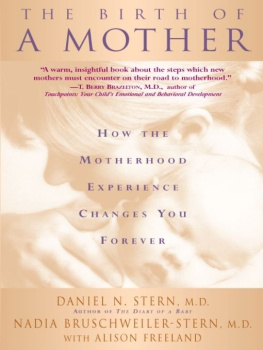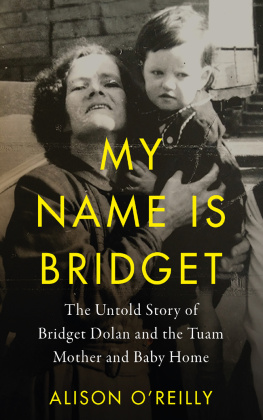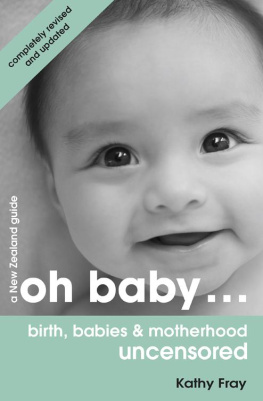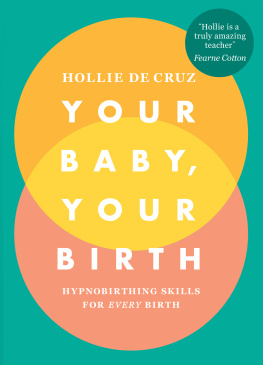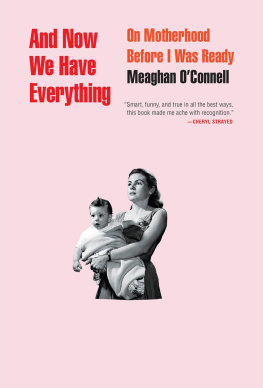Table of Contents
ALSO BY DANIEL N. STERN, M.D.
The First Relationship (1977)
The Interpersonal World of the Infant (1985)
Diary of a Baby (1989)
The Motherhood Constellation (1995)
To Adrien and Alice
Acknowledgments
WE WISH, above all, to acknowledge the many mothers who in their normal daily actions have inspired us, pointed out unseen directions, uncovered so many things that we were not fully aware of, and who simply taught us. In a similar vein, I (D.S.) am deeply grateful to my coauthor Nadia, and to Alison, for putting every part that I wrote through the crucial test of their experience as mothers.
Gail Winston, our editor, has been encouraging, critical, patient, and impatient, each at the right time in the needed dose. Her help has been immeasurable.
Some of the research and the writing of this book has been made possible thanks to support from the Steven Ross family.
INTRODUCTION
The Motherhood Mindset
THIS BOOK is about the inner, often private experience of becoming a mother. In a sense, a mother has to be born psychologically much as her baby is born physically. What a woman gives birth to in her mind is not a new human being, but a new identity: the sense of being a mother. How does this identity emerge in each woman, and what does the process feel like? There are many books about the physiological and practical aspects of motherhood, but far less is written about the mental world where the new identity is formed. Becoming a mother is accomplished by the labor each woman performs on the landscape of her mind, labor resulting in a motherhood mindset, a deep and private realm of experience.
This motherhood mindset is not born at the moment the baby gives its first cry. The birth of a mother does not take place in one dramatic, defining moment, but gradually emerges from the cumulative work of the many months that precede and follow the actual birth of the baby.
What produces this motherhood mindset? How is it unique to each woman, yet shared by all mothers? What phases does it pass through? And how can you identify the passages of this remarkable new inner realm and learn to navigate its waters? That is the subject of this book.
We start at the beginning: Who exactly is a mother, and is she inherently different from other women? It may sound like a simple question, but in fact it strikes at the most basic assumptions held by the psychological and therapeutic communities.
As a psychiatrist, I have observed and treated parents and babies all my professional life. For almost thirty years, I researched the psychological development of infants, clinically observed the mother-infant relationship, and worked with mothers and babies whose relationships were disturbed. During most of that time, I considered a mother to be a woman with an added responsibility demanding new actions and reactions. True, she would have to develop a new repertoire of feelings and behaviors when she had a baby, but my conviction was that she would remain essentially the same woman she was before the baby was born.
Both male and female members of the psychological community have traditionally relied on accepted theories when working with mothers. Most psychological theories are based on general principles that apply to a broad spectrum of people and the ways their minds function. In the quest for general rules, psychotherapists have believed that all people have a basic psychic organization, or mindset, that explains their behavior. A persons mindset is thought to last a lifetime.
This mindset is what helps each one of us organize our mental lives. Our mindset determines what we consider most important, what we are most sensitive to, and what we notice in a given situation. It dictates what we find pleasant and exciting, frightening or boring. It affects the choices we make and our tendencies to act in one way instead of another. Our mindsets organize our mental lives to make us the coherent individuals we are.
Depending upon the orientation of a mental health professional, he or she will refer to an oedipal complex, or a secure or insecure personality, or a dependent or independent character, and use these theories to help a person understand his own mindset. No matter what theory is subscribed to, however, in none of them is motherhood viewed as anything but a slight variation on the already existing mindset. No one thought that a womans mental life could fundamentally change with the arrival of a baby.
I believed this for many years until my coauthor (who is also my wife) helped me realize that the traditional psychological models did not accommodate the influence of motherhood on a womans mindset. It was a simple realization, but it has profound implications for the mental health profession as well as for each woman entering the world of motherhood. In the course of becoming a mother, I realized, a woman develops a mindset fundamentally different from the one she held before, and enters a realm of experience not known to non-mothers. No matter what a womans previous motives, vulnerabilities, and emotional reactions, when she becomes a mother, she will, for a time, operate from an entirely new mindset. This motherhood mindset pushes her preexisting mental life aside and rushes forward to fill the center stage of her inner life, giving it a different makeup entirely.
For me, the uniqueness of the motherhood mindset was a revelation, but in many ways it now seems almost to be simple common sense. After all, as you prepare to become a mother, you are facing an experience unlike any other in your life. When you have a baby, it will determine for a certain period of time what you think about, what you fear or hope for, and what your fantasies will be. It will influence your feelings and actions, and even heighten your basic sensory and information-processing systems. Having a child will redirect your preferences and pleasures, and most likely will realign some of your values. In a most startling way, it will influence all of your previous relationships, and cause you to reevaluate your closest associations and redefine your role in your own familys history.
As a mother, you will of necessity give birth to the motherhood mindset that for a time will act like the North Star in orienting your path in life. This is not merely a reorganization of your mental life, but an entirely new organization that will exist alongside (and most probably influence) your previous one. And all of this will happen inside your mind, while outside, in your physical life, you are learning to handle an equally new set of tasks such as feeding, nurturing, playing with, putting to sleep, and beginning to love this new human being. No wonder the mothers inner landscape has been little explored and explained. Mothers scarcely have time to identify it themselves!
As a mother hearing this for the first time, you may ask, Is this mindset going to last my whole lifetime? In my experience as a clinician, I see that it does last throughout a mothers life, but it does not always occupy center stage. After the birth of a baby, the motherhood mindset will fill the life of your mind, immediately determining your thoughts and behavior. Your previous mental organization is simply pushed into the backgroundfor how long depends on the woman. It can dominate for several weeks, several months, or many years. Very often practical and financial realities such as the need to return to work play a large role in determining how long this mindset holds center stage.

